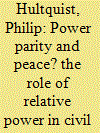| Srl | Item |
| 1 |
ID:
092782


|
|
|
|
|
| Publication |
2009.
|
| Summary/Abstract |
In Canada, settlements between oil and gas pipelines and users have largely superseded the litigation of major pipeline toll cases since 1995. Quantitatively, from the first half to the second half of the period 1985-2007 the average number of pipeline toll hearing days in Canada fell by three-quarters. On average, settlements last more than twice as long as litigated outcomes and have cut regulatory processing times by about one third for gas pipelines and by about two thirds for oil pipelines, with the result that regulatory processing times per effective toll-year have fallen to 13% and 27% respectively of previous levels. Qualitatively, settlements have been used to determine prices, operating and capital cost projections, return on equity, service quality improvements, risk-sharing investments and information requirements. They were the vehicle by which multi-year incentive agreements developed rapidly for all pipelines. They have also been used to introduce light-handed regulation. They have provided a mechanism for fruitful collaboration between pipelines and their customers and have changed attitudes in the industry. Two key actions of the National Energy Board have facilitated settlements by clarifying expectations and property rights: its generic cost of capital decision that removes the market power of the pipeline and enables effective negotiation with users, and its willingness to judge a settlement by the reasonableness of the process leading up to it instead of imposing the Board's own values on the outcome.
|
|
|
|
|
|
|
|
|
|
|
|
|
|
|
|
| 2 |
ID:
103444


|
|
|
|
|
| Publication |
2011.
|
| Summary/Abstract |
The movement from traditional regulatory hearings to negotiated settlements represents both a departure from cost of service regulation and a relaxation of regulatory oversight. Under negotiation parties are able to renegotiate inclusions in their cost of service while simultaneously creating a profit margin for the regulated firm where none existed under the cost of service outcome of a traditional hearing. This paper constructs a model to illustrate the existence of positive gains to pipeline and shipper from the re-allocation of expenses through time in the regulated pipeline services market in Canada. Behaviour consistent with the model is observable in anecdotal and econometric evidence gathered from the library of the National Energy Board of Canada, responsible for pipeline toll regulation in Canada. Empirical investigation by Littlechild (2009a) into settlement procedures in the Florida electricity market reveals similar findings; however, this analysis represents the first attempt to model the behaviour formally. The econometric analysis uses new data collected and compiled specifically for this exercise.
|
|
|
|
|
|
|
|
|
|
|
|
|
|
|
|
| 3 |
ID:
124112


|
|
|
|
|
| Publication |
2013.
|
| Summary/Abstract |
Theories of civil war highlight how relative power affects conflict onset, dynamics, strategy, outcome, and duration. Yet most studies of civil war have not been able to capture rebel power adequately and often rely on national-level characteristics to infer relative power distributions. This study addresses this shortcoming by using a troop strength measure to test arguments about how relative power affects the likelihood of civil conflict settlement. Drawing on the international crisis bargaining literature, while noting the inherent differences between interstate and intrastate conflicts, this study argues that the condition of power parity increases the likelihood of negotiated settlement and ceasefire. Weak rebels are unable to achieve concessions through negotiation since governments view them as minor threats. Yet governments have difficulty defeating weak rebels due to an emphasis on guerrilla warfare. On the other end of the spectrum, rebels that are superior to the government in strength are unlikely to settle given their power advantage. Strong rebels that can rival the strength of the government (i.e. they are near parity) can exact more concessions because fighting at parity exposes information about how long each side can hold out while escalating the costs of war, giving each side a greater incentive to negotiate and eventually seek a ceasefire or peace agreement. This argument is supported using data on 112 dyads in the post-Cold War period.
|
|
|
|
|
|
|
|
|
|
|
|
|
|
|
|